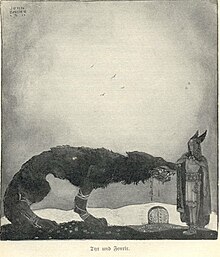Ragnarök
Appearance

Heimdall will blow the Gjallerhorn only once, at the end of all things, at Ragnarok. ~ Neil Gaiman
Ragnarök, in Norse mythology, is a series of prophesied events, including a great battle and various natural disasters, foretold to ultimately result in the death of a number of major figures (including the gods Odin, Thor, Týr, Freyr, Heimdallr, and Loki).
Quotes
[edit]

and kill each other,
sisters' children
will defile kinship.
It is harsh in the world,
whoredom rife
—an axe age, a sword age
—shields are riven—
a wind age, a wolf age—
before the world goes headlong.
No man will have
mercy on another. ~ Völuspá
- Odin gave the Gjallerhorn to Heimdall, watchman of the gods. On the day the Gjallerhorn is blown, it will wake the gods, no matter where they are, no matter how deeply they sleep.
Heimdall will blow the Gjallerhorn only once, at the end of all things, at Ragnarok.- Neil Gaiman, in Norse Mythology (2017), Mimir’s Head and Odin’s Eye
- Ragnarok is coming. When the sky splits asunder and the dark powers of Muspell march out on their war journey, Frey will wish he still had his sword.
- Neil Gaiman, in Norse Mythology (2017), The Story of Gerd and Frey
- Now I shall tell you of the days to come.
I shall tell you how it will end, and then how it will begin once more. These are dark days I will tell you of, dark days and hidden things, concerning the ends of the earth and the death of the gods. Listen, and you will learn.
This is how we will know that the end times are upon us. It will be far from the age of the gods, in the time of men. It will happen when the gods all sleep, every god but all-seeing Heimdall. He will watch everything as it begins, although he will be powerless to prevent what he sees from happening.- Neil Gaiman, in Norse Mythology (2017), Ragnarok: The Final Destiny of the Gods
- At Ragnarok the world as we know it will be destroyed. But that is not the end. After a long time, a time of healing, a new universe will be created, one better and cleaner and free from the evils of this world. It too will last for countless millennia... until again the forces of evil and cold contend against the forces of goodness and light... and again there is a time of rest, followed by a new creation and another chance for men. Nothing is ever finished, nothing is ever perfect, but over and over again the race of men gets another chance to do better than last time, ever and again without end.
- Robert A. Heinlein, in A Comedy of Justice (1984), Margrethe, in Ch. 11
- I am sorry... but I do believe that Loki is loose. The signs show it. Now anything can happen. We enter the Twilight of the Gods. Ragnarok comes. Our world ends.
- Robert A. Heinlein, in A Comedy of Justice (1984), Margrethe, in Ch. 11
- I had no objection to calling Armageddon by the name 'Ragnarok'. Jesus or Joshua or Jesu; Mary or Miriam or Maryam or Maria, Jehovah or Yahweh — any verbal symbol will do as long as speaker and listener agree on meaning. But Loki? Ask me to believe that a mythical demigod of an ignorant, barbarian race has wrought changes in the whole universe? Now, really!
- Robert A. Heinlein, in A Comedy of Justice (1984), Alexander Hergensheimer (aka Alec Graham), in Ch. 12
- Ragnarok, the end of the Viking world with a terrible winter that covered the Earth in ice, when vile crimes were rampant and all humanity lost.
I could see how someone impressionable might get it into their head that we were at the end of time.
- Brothers will fight
and kill each other,
sisters' children
will defile kinship.
It is harsh in the world,
whoredom rife
—an axe age, a sword age
—shields are riven—
a wind age, a wolf age—
before the world goes headlong.
No man will have
mercy on another.- Description of the state of humanity at the time of Ragnarök, in the Völuspá (c. 901 - 1000), as translated by Ursula Dronke in The Poetic Edda : Volume II : Mythological Poems (1997)
- Then is fulfilled Hlín's
second sorrow,
when Óðinn goes
to fight with the wolf,
and Beli's slayer,
bright, against Surtr.
Then shall Frigg's
sweet friend fall.



